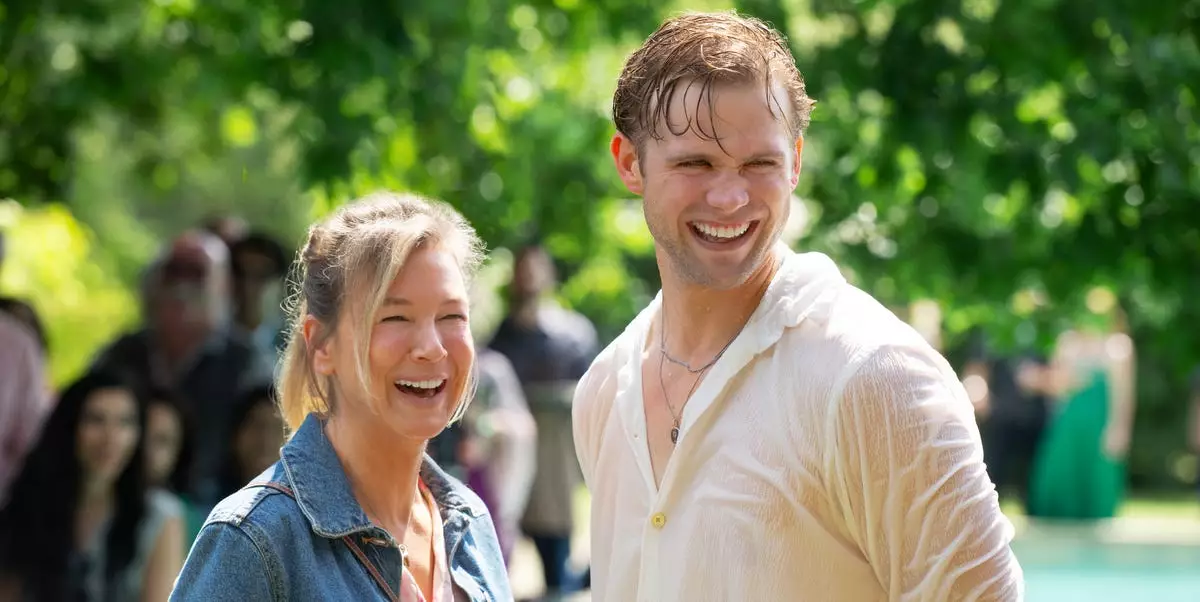After nearly a decade since her last on-screen appearance, Bridget Jones is back, and this time the character, portrayed by Renée Zellweger, is navigating the complexities of life in her fifties. The latest installment, titled *Bridget Jones: Mad About the Boy*, is based on Helen Fielding’s 2013 novel and is set to premiere on February 13 on Peacock, strategically timed to coincide with Valentine’s Day. This new chapter not only aims to entertain but also to resonate with audiences as Bridget faces issues of love, loss, and self-discovery in a poignant manner.
The film opens as Bridget grapples with the tragic loss of her husband, Mark Darcy, portrayed by Colin Firth, who dies during a philanthropic mission in Sudan. This pivotal moment sets the stage for a compelling narrative that explores themes of grief and resilience. As she strives to raise their two children, Billy and Mabel, as a single mother, viewers witness a transformation in Bridget’s character—a balancing act between mourning and rediscovering herself.
In her quest for love, Bridget finds herself entangled in a decidedly modern love triangle, introducing audiences to Roxster, a flirtatious young man played by Leo Woodall, and Mr. Wallaker, her son’s science teacher, brought to life by Chiwetel Ejiofor. This setup not only showcases Bridget’s struggle to adapt to the world of dating after a lengthy absence but also reflects the societal shifts regarding relationships as one ages. The introduction of younger romantic interests broadens the narrative, acknowledging that love has no expiration date, and challenges gender norms related to dating dynamics.
The return of familiar characters elevates the film, providing a comforting sense of continuity. Hugh Grant reprises his role as the charmingly roguish Daniel Cleaver, surprising audiences since his character had previously seemed to meet a dramatic end. Additionally, beloved side characters, such as Bridget’s parents, played by Jim Broadbent and Gemma Jones, as well as her steadfast friends, add layers of humor and support to her chaotic life. These elements bring depth to the overarching theme of the importance of community and friendship amidst personal turmoil.
Zellweger’s connection to Bridget transcends mere performance; the actress shares an emotional bond with the character that has been cultivated over years. She candidly expressed her reluctance to say goodbye to Bridget, illustrating the impact that this role has had on her career and personal life. “I don’t think I’ll ever let go of Bridget,” she commented in an interview. This clarity reflects not only the difficulties of letting go of a character that many have come to cherish but also emphasizes Bridget’s relatability, especially as she faces challenges that resonate with a broad audience.
Though Zellweger has quipped about the possibility of this being her final performance as Bridget, her portrayal leaves a lasting impression, and if true, the film serves as a triumphant farewell filled with her characteristic blend of humor and vulnerability. Even if this marks the conclusion of Bridget’s cinematic journey, it feels appropriate that she would leave fans with a chaotic yet endearing portrayal of life, complete with her signature ability to rise up after being knocked down.
Unlike its predecessors, which graced the silver screen with theatrical releases, *Bridget Jones: Mad About the Boy* opts for a direct-to-streaming model on Peacock. This choice reflects the evolution of the film industry, especially in the wake of changing viewing habits accelerated by the pandemic. By embracing this shift, the film marks a significant turn in franchise strategy, indicating how convenience often trumps tradition in contemporary media consumption.
As anticipation builds for the premiere, it remains clear that Bridget Jones’ return is not merely about nostalgia. It is an invitation to explore essential facets of life, love, and loss that resonate across generations. Bridget’s journey is emblematic of resilience, and if there is one takeaway from this next chapter, it is the timeless lesson that life—and love—always offers us another chance to thrive amidst change, albeit in true Bridget fashion.

